El Mal Querer and the narrative thread elaborated by Rosalía (part I)
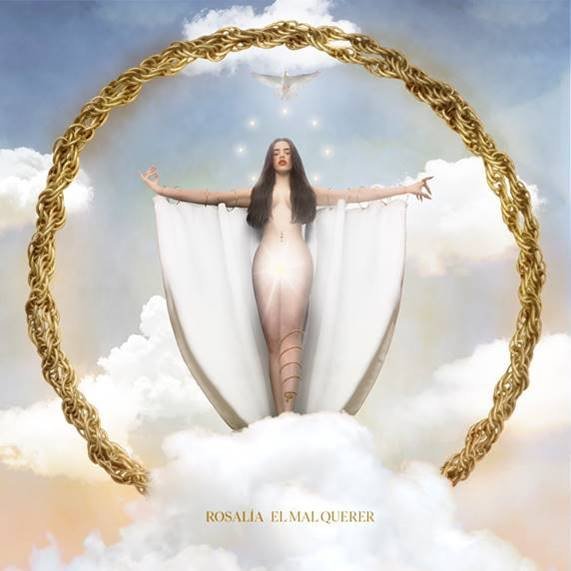
El Mal Querer (Bad Romance) is the second album of singer Rosalía, who was born in Spain, in 1993; this was also her bachelor's degree work to graduate from college. In it she decided to fuse flamenco with different genres and musical references (electronic music, urban, Gregorian chant, African music, among others). Its diverse influences make it difficult to classify the album into a single genre.
In addition to the innovation from the musical point of view and the visual conceptualization, both in the videoclips and in the illustrations for each song made by Filip Custic, the album has a very interesting narrative thread: it is based on an anonymous novel from the 14th century called Flamenca. It tells the story of a woman who marries a man who, out of jealousy, confines her.
Thus, Rosalía narrates in her album the story of this woman chapter by chapter, from the "Augurio" she has since the first song ("Malamente"), Passing through the "Boda" (where we already appreciate the violent nature of the husband in "Que no salga la luna"), then the jealousy manifested in "Pienso en tu mirá," the realization of the toxic relationship in "De aquí no sales," and so on until the last song, "A ningún hombre." In this song the protagonist is already liberated from her oppressor and will not allow any other man to trample on her, conscious of what she has lived and of her own value.
In this first part, I will speak briefly about my interpretation of the first five chapters of the album.
Malamente. Chapter 1: Augurio
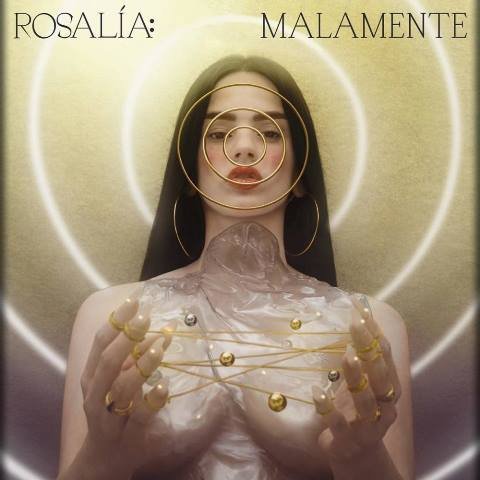
As its name indicates, "Augurio" (Omen) presents us with the premonition that something bad will happen, that the marriage that is about to take place will bring tragedy.
That little broken glass
I felt how it creaked
Before it fell to the ground
I already knew it was breaking
This presentiment comes with the message of a gypsy woman to the protagonist, who warns her that it is better not to go out to see the night because it is rare, and her fiancé begins to subtly question her. In addition to this, she has a dream of a bridge that shakes as she tries to cross it, foreshadowing the obstacle she will face in her future.
The night has become rare
The stars and the moon have come out
That gypsy told me that (what?)
Better not to go out to see it (no)
I dream that I’m walking
Through a bridge and the pavement (look, look, look, look)
The more I want to cross it (go)
The more it moves and staggers
Despite these signs, she decides to marry and discard the premonition, invoking protection and assuring that "although the night is not beautiful," she will come out to shine in any way.
Although it isn’t beautiful
The night, God
I’m going out
In my little hand, the hoops sparkling
In my skin, the chorals
May protect me and save me
May enlighten me, guard me
And forward
I won’t waste a minute on thinking about you again
Que no salga la luna. Chapter 2: Boda
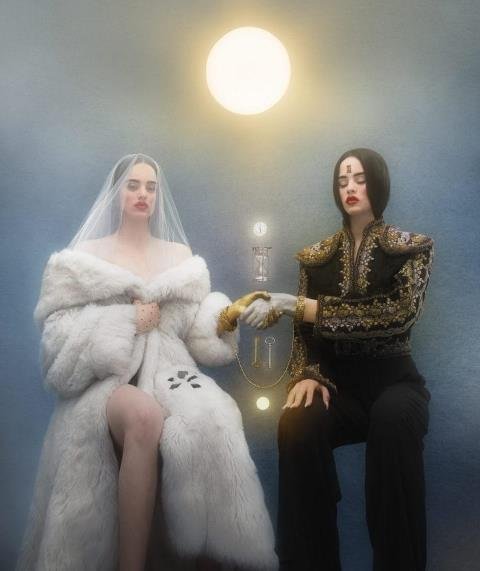
Through Rosalía's voice, in this song we listen to the groom and he reveals his intentions to us. This theme is influenced by the play "Bodas de Sangre" by Federico García Lorca, in which the moon has an important symbology and is associated with death. He brags about his luck in getting his future wife, and says that her eyes shone "like a knife" when he gave her the engagement ring. This image is important (and not only the image, but also the sound of the knife that can be heard when he says this word) because it already denotes the violence in this character, as he associates the brightness in his girlfriend's eyes with a weapon.
Like the blade of a knife
Were her eyes shining when I gave her the ring
(Were the eyes shining)
(Were the eyes shining)
Were her eyes shining
(Were the eyes shining)
(Were the eyes shining)
Were her eyes shining
(Were the eyes shining)
He orders everyone to remain silent: "If there is anyone here who opposes, may he not raise his voice," and the feminine voices surrounding him say "May the bride not hear it," and the masculine voices "May the moon not come out ‘cause it doesn’t have a reason." The man even wants to stop the moon from rising and interrupting their union.
He continues to brag about his bride and says that she deserves a throne, crowned with pearls and gold (this image of the jewels is very important throughout the album, especially in chapter 4, which we will see later). And it is in this moment where we begin to appreciate the true face of the groom:
(Whether she wants or doesn’t, whether she does, or she doesn’t
She’s going to be with me until she dies)Pinned with silver, pinned with silver
Without saying anything she’s sworn to me that for me she’d kill herself
Without saying anything she’s sworn to me that for me she’d kill herself
Here he confesses that he doesn't care about her consent. Being his wife, she "swore to him" that she will be with him until death and that she belongs to him, without needing to say anything. The woman is seen as property, as an object, and he is not interested in her desires or her decisions.
Pienso en tu mirá. Chapter 3: Celos
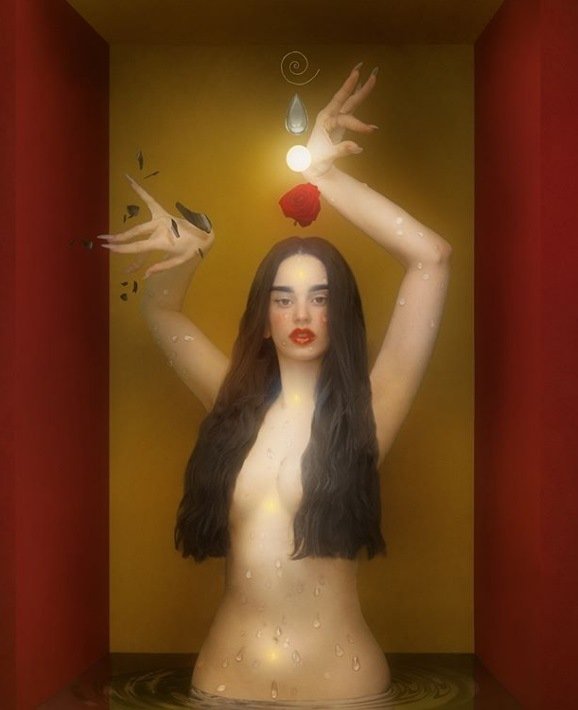
This song focuses on the jealousy of the husband, who is again the character who sings, and with his false protection expresses that he is afraid that his wife will come out because they will see how beautiful she is and the "dimples" that form in her face when she smiles. It is the song of a sick, jealous man: he says that he's jealous of the wind that passes through her hair and the gold that wraps around her neck. The way he says it gives it a "romantic" tone, but it's actually very disturbing. It's the kind of images that are usually associated with something poetic; it's not like that. With this Rosalía presents a criticism of what is considered romance and is, in reality, gender violence.
I fear when you go out
Smiling to the street
Because everyone can see
Your little dimples showing upAnd of the air passing by
For lifting your hair up
And of the gold that dresses you
For hanging from your neck
And of the sky and the Moon
For you wanting to look at them
Even of the water your drink
When you wet your lips
He tries to convince his wife that this is to protect her, but in the chorus it is evident that this pathological jealousy and his control over her and her husband's constant vigilance hurt her; his gaze is present everywhere.
I think of your look, your look, nailed, is a bullet to the chest
I think of your look, your look, nailed, is a bullet to the chest
I think of your look, your look, nailed, is a bullet to the chestI think of your look
I think of your look
De aquí no sales. Chapter 4: Disputa
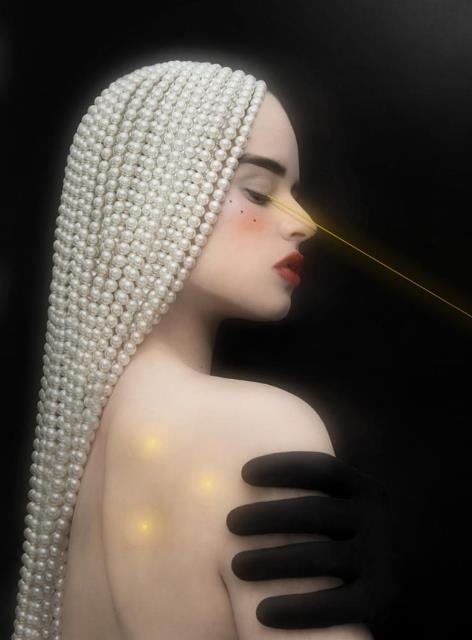
One of the most experimental songs on the album. Rosalía incorporated motorbike sounds into it to give it a feeling of aggressiveness. It is in this song where the husband's aggression becomes more evident and he hurts his wife and forbids her to leave home. He manipulates her by saying "It hurts more to me than to you," which is typical of abusers, and makes her feel guilty by telling her that he has given her beautiful things (we return to the image of the jewels in chapter 2, the pearls and the gold in the wife's hair which are also present in the illustration in this chapter).
I, who pamper you so much
And you provoke me
You won't get out of hereIt hurts me much more
Than it’s hurting you
Don't mess with meWith the back of my hand
I make it clear to you
(Translation by me)
Finally, he tells her that just as he offers her good things, he can offer her bad things; it depends on her (and on her submission to him) what she will receive. The omen presented in the first chapter is palpable and the woman suffers physical and psychological abuse by her husband, whose aggressiveness we had detected from the second chapter and became more evident in the third, with his jealousy.
Bitter sorrows I give to you
And sweets too
(Translation by me)
Through Instagram stories, Rosalía herself assured that this is the most violent song on the album and wanted to emphasize this with the palmas (clapping) and the sample of her voice screaming at the end of the song.
Reniego. Chapter 5: Lamento

As its name indicates, this is the chapter of lament. The protagonist expresses her greatest pain and says that "on the outside she laughs, but on the inside she cries." This is manifested at the beginning of the song, when she sings "Tiri tiri tiri" followed by "Ay ay ay" because they are two contrasting expressions, one of happiness and one of sadness.
The woman denies her destiny, because her husband has also done it, and refuses to be the submissive woman he wants her to be. In the midst of her affliction, she realizes that she is now actually getting to know her husband; finally the veil has fallen from her eyes.
As he did, I renege
As he did, I renege
Oh, I renege.
I renege on my fate
As he did, I renege
As he did, I renege
Oh, now I've known you
(Translation by me)
Be ready for the second part of this post about Rosalía's album El Mal Querer, as we will analyze the remaining six songs and talk about the perception of gender violence today.
By the way: today, November 25, is the International Day for the Elimination of Violence against Women, and an excellent way to reflect on this issue is to look into Rosalía's work and think how many cases similar to Flamenca exist today, and what we can do about it.
Until next time!